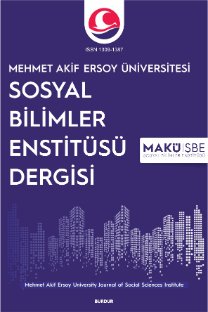ÖĞRETMENLERİN STRES DÜZEYLERİ ÜZERİNE KARMA BİR ARAŞTIRMA: SOSYAL HİZMET MESLEĞİ PERSPEKTİFİNDEN BİR TARTIŞMA
Öğretmen, Stres, Stres Kaynakları
A MIXED RESEARCH ON STRESS LEVEL OF THE TEACHERS: A DISCUSSION FROM THE PERSPECTIVE OF SOCIAL WORK PROFESSION
Teacher, Stress, Stress Factor,
___
- Akgemci, T. (2001). Örgütlerde stres ve yönetimi. Atatürk Üniversitesi İktisadi ve İdari Bilimler Dergisi, 15(1-2). Aydın, İ. (2016). İş yaşamında stres.Ankara: Pegem Yayınları
- Aydın, Ş. (2004). “Örgütsel Stres Yönetimi”, Dokuz Eylül Üniversitesi Sosyal Bilimler Enstitüsü Dergisi, C.VI, S.3, İzmir.
- Aytaç, S. (2017). Stres Kaynakları ve Stresin Psikolojik Semptomlarının Öfke Kontrolü ile İlişkisi: Polis Memurları Üzerine Bir Araştırma. Sosyal Siyaset Konferansları Dergisi, (69), 1-27.
- Balaban, J. (2000). Temel Eğitimde Öğretmenlerin Stres Kaynaklari Ve Başa Çikma Teknikleri. Pamukkale Üniversitesi Eğitim Fakültesi Dergisi, 7(7), 188-195.
- Baltaş, A. ve Baltaş, Z. (2002) Stres ve başa çıkma yolları. 21. Basım İstanbul: Remzi Kitabevi.
- Baqutayan, S. M. S. (2015). Stress and coping mechanisms: A historical overview. Mediterranean Journal of Social Sciences, 6(2 S1), 479-479.
- Can, H., Aşan, Ö., & Aydın, E. M. (2006). Örgütsel davranış. Arıkan Basım Yayın Dağılım
- Creswell, J. W. (2003). Karma Yöntem Araştırmalarına Giriş. Ankara: PegemAkademi Yayıncılık
- Dinçsever A. (1988). Tedavi Hizmetlerinde Çalışan Hemşirelerin İşlevlerini Yerine Getirirken Karşılaştıkları Sorunlar ve Yaşadıkları Stresin Araştırılması. Yayımlanmamış Yüksek Lisans Tezi, İstanbul Üniversitesi Sağlık Bilimleri Enstitüsü, İstanbul.
- Güçlü, N. (2001). Stres yönetimi. Gazi Üniversitesi Gazi Eğitim Fakültesi Dergisi, 21(1).
- Gümüştekin, G. E., & Öztemiz, A. B. (2004). Örgütsel stres yönetimi ve uçucu personel üzerinde bir uygulama. Erciyes Üniversitesi İktisadi ve İdari Bilimler Fakültesi Dergisi, (23)
- Han, J. and Yin, H. (2016). Teacher motivation: definition, research development and implications for teachers, Cogent Education, 3(1), 1-18. Kavi, E. (2017). Örgütsel stres ve stres yönetimi. Ersin Kavi (ed), Bursa: Dora Yay.
- Kyriacou, C.(2016). Öğretmenlerde Stresi Giderme.Pegem Yayınları
- Malone, P., & Reid, M. (1983). Industrial Social Work: Part II: A Model for Practice. Asia Pacific Journal of Human Resources, 21(1), 36-43.
- Riggio, R. E. (2014). Endüstri ve örgüt psikolojisine giriş. Nobel Akademik Yayıncılık.
- Rose, R. (2001). Primary school teacher perceptions of the conditions required to include pupils with special educational needs, Educational Review, 53(2), 147-156. Sabuncoğlu, Z., Tüz, M. (2001). Örgütsel Psikoloji. Bursa: Ezgi Kitabevi.
- Sağlam, Z. (2005). Acil Servis Hemşirelerinin Stres Kaynakları ve Başa Çıkma Yöntemlerinin Belirlenmesi, Yayımlanmamış Yüksek Lisans Tezi, Marmara Üniversitesi Sağlık Bilimleri Enstitüsü, İstanbul.
- Taddei, S., Contena, B., Pepe, A., Venturini, E. (2017). The development and psychometric properties of the teacher social stress scale-student related (TSS-Sr), Scandinavian Journal of Educational Research, DOI: 10.1080/00313831.2017.1336481
- Yayın Aralığı: Yılda 2 Sayı
- Başlangıç: 2009
- Yayıncı: Burdur Mehmet Akif Ersoy Üniversitesi Sosyal Bilimler Enstitüsü
YALNIZLIK DÜZEYİNİN YORDANMASINDA ANNE BABA TUTUMLARI VE OKUL TÜKENMİŞLİĞİNİN ROLÜ
M. Yüksel ERDOGDU, Gufran GÜNDOĞMUŞ
ENDÜSTRİ 4.0 ÇAĞINDA ÖĞRENCİ GÖZÜYLE ÖĞRETMENİN GEREKLİLİĞİ VE ROLÜ
DÖVİZ KURU VE HİSSE SENEDİ FİYATI ARASINDAKİ ETKİLEŞİM: TÜRK ULAŞTIRMA SEKTÖRÜNDEN BİR BULGU
Abdullah AÇIK, İlke Sezin AYAZ, Esra BARAN KASAPOĞLU
SAĞLIK BİLİMLERİ FAKÜLTESİ ÖĞRENCİLERİNİN E-SAĞLIK OKURYAZARLIĞI DÜZEYLERİNİN BELİRLENMESİ
Ali YILMAZ, Meltem SAYGILI, Mustafa KAYA
KADIN TURİST REHBERLERİNİN MESLEKİ SORUNLARININ BELİRLENMESİ
Özlem KÖROĞLU, Hasret ULUSOY YILDIRIM, Arzu KILIÇ
ENDÜSTRİ 4.0’IN FARKINDALIK ANALİZİ
Kevser YILMAZ, Aşkın ÖZDAĞOĞLU
NESTORIUS, CYRILL VE PULCHERIA ÜÇGENİNDE MARYOLOJİ VE NASTURİLİĞİN DOĞUŞU
Sayime DURMAZ, Satılmış GÖKBAYIR
Bülent Diclehan ÇADIRCI, Bilal GÜNER
